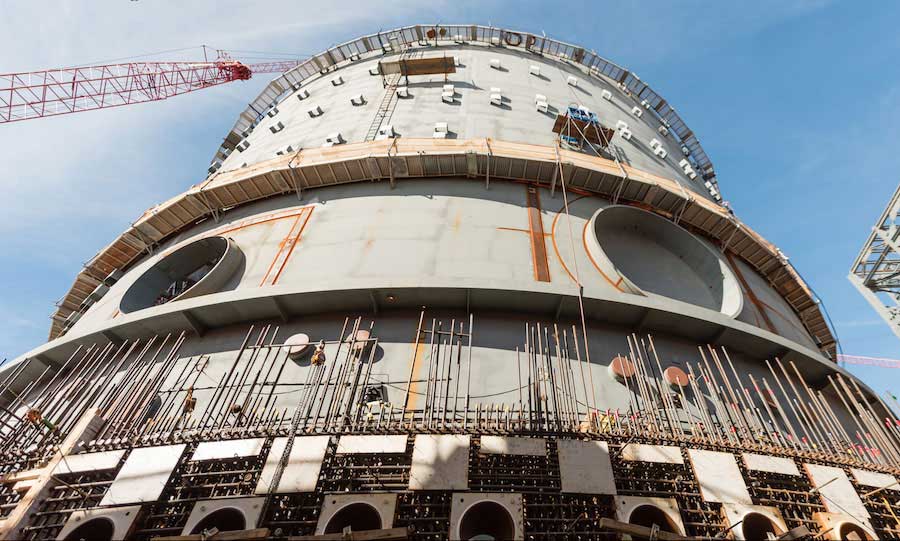 |
| Asherman |
Under the 12-year leadership of CEO Philip Asherman, Chicago Bridge & Iron grew, as the company points out, from a specialty tank subcontractor to a global energy infrastructure powerhouse. With Asherman's recently announced retirement, he leaves challenges to his successor, Chief Operating Officer Patrick Mullen, that match the scale of CB&I's ambitions.
CB&I's stock price has plummeted to the $16 range from nearly $90 a share three years ago, with first-quarter earnings sustaining a significant hit. While the collapse in energy prices has taken a toll, CB&I also has been dogged, first by the cash drain and now by the uncertainties surrounding its two nuclear power-plant subcontracts with Westinghouse. Problems with a pair of unnamed union construction projects, which further cut first-quarter profits, have not helped.
Investors want a better understanding of the steps CB&I will take in the coming weeks and months to bolster its balance sheet, according to a recent report by CreditSuisse analysts. CB&I recently raised cash by selling a noncore asset. But the matter has been "further complicated by the liabilities associated with the Westinghouse lawsuit and problem projects," the report notes.
Nuclear Complexities
CB&I had hoped it could get its struggling Shaw Group nuclear-construction office off its balance sheet. It bought the giant contractor in 2013 for $3 billion, expanding its energy construction capabilities but also layering on debt.
In 2015, it agreed to sell its contracts to Westinghouse, which filed in March for protection from its creditors in U.S. bankruptcy court. In exchange for paying nothing up front, Westinghouse agreed to cover the cost overruns at the two nuclear plants CB&I was building in South Carolina and Georgia as a subcontractor to Westinghouse. The two plants are at least three years overdue and $13 billion over budget. Things headed further downhill last year, when CB&I claimed Westinghouse still owed it $428 million from the deal. Westinghouse claimed it was owed an additional $2 billion to cover liabilities related to the nuclear-plant projects that were not disclosed at the time the deal was signed.
CB&I filed suit and is currently in a court-ordered arbitration with Westinghouse. The outcome remains unclear.
While a CB&I spokesman said the company remains confident of a positive outcome, CB&I investors are split about what comes next. Short sellers smell blood, according to comments made on the website TalkMarkets. However, the CB&I spokesman pointed to positive signs for future growth, with an increase in new business, including a $1.3-billion engineer-procure-construct contract from Total for an ethane cracker in Texas.
Another source of optimism is CB&I's healthy $19-billion backlog.
"Regarding the current litigation with Westinghouse, we remain confident in our position and expect a decision from the Delaware Supreme Court in the near future," the company's spokesman wrote in an email. "A favorable ruling will move us one step closer to what we believe will be a positive resolution."
The optimists haven't run out of reasons yet for the vindication of Asherman's view of the company. They believe that Asherman, one of the highest-paid executives in construction, was a builder of long-term value, rather than one who took too much risk.
In an analysis posted on the financial website Seeking Alpha, Daniel Jones, who started bulking up on CB&I stock when it was still more than $50 a share, said he has not lost faith. "I believe its true value lies, once the market recovers, at a price not too far off the highs it saw in 2014."
In a separate action, the U.S. Securities and Exchange Commission announced on June 7 fraud charges against a former Shaw consultant, Michael Trahan, for insider trading ahead of the CB&I acquisition announcement.
The SEC complaint, filed in the U.S. District Court for the western district of Louisiana, alleges that in 2012, while Trahan's firm, Petra Consultants Inc., was a consultant, he was told by a Shaw employee about the impending deal.
The SEC alleges that Petra and Trahan were bound by an agreement with Shaw to keep information received from the client confidential but Trahan bought 5,600 shares of Shaw common stock the day he learned of the sale. The SEC further alleges that Trahan sold the stock shortly after the announcement of the acquisition for a profit of $69,735. Trahan could not be reached.






Post a comment to this article
Report Abusive Comment